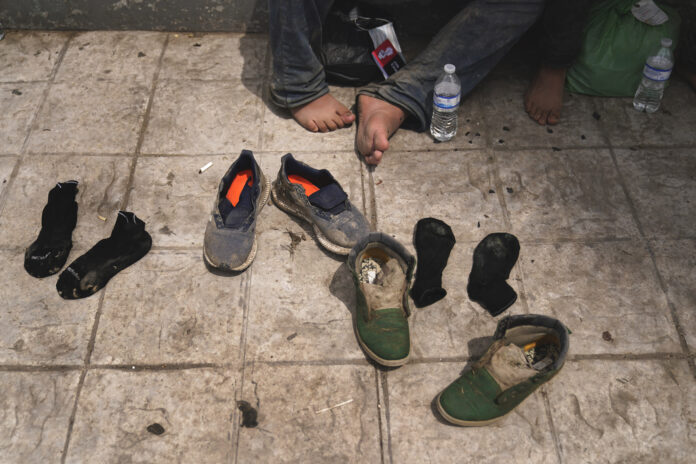A group of migrants sat around a table last Saturday afternoon in Reynosa surrounding a woman and daughter feeling confused following their expulsion from the U.S. that morning.
“I didn’t know they were sending me back to Mexico,” Jenny, a 33-year-old Honduran mother of a 9 year-old girl, said. Her last name is withheld to protect her identity and safety.
Jenny journeyed to the U.S. fleeing violence in Honduras but fell victim to kidnapping, sexual assault, and extortion along the way.
She was held for about two weeks while the family back home raised money to pay her ransom. They even printed pictures the kidnappers sent the family of the mom and daughter held against their will, and taped the photocopy to plastic water jugs they used to collect money around the neighborhood.
The day before they arrived in Reynosa, Jenny and her daughter turned themselves into U.S. federal officers the previous day, last Friday, seeking asylum. Jenny asked to be patted down gently; a kidnapping in Mexico left her sore and bruised around her face, pelvic and abdominal area.
Other than the age of Jenny’s daughter, she said officers didn’t ask her much else. Similar accounts were shared by dozens of migrants in Reynosa sent back from the U.S.
A few hours later, the mother and daughter were boarded onto a bus, released at the Hidalgo port of entry and told to walk toward Mexico. The sudden realization that their journey was cut short — via a federal public health code known as Title 42 — left Jenny undone.
She cried telling the migrants around her at the table she preferred death than to be sent back to Mexico where she escaped that fate a few weeks ago.
A quick trust formed around that table, knitting a safe, but fragile space to talk about harrowing accounts of kidnapping and trauma experienced on the journey to a country they were not allowed to enter.
“Necesitamos que desahogarnos ,” Janet, 30, an Honduran mother of three who preferred not to share her last name for safety reasons, said. The word desahogar is most commonly translated as “to vent” but its direct translation in English is to un-drown.
That desire to emotionally unburden themselves led to the creation of a mental health component by medical providers like Doctors Without Borders.
In 2017, they created Proyecto Fronteras to treat what Karla Villalpando, manager of the mental health services in Reynosa, called “systemic trauma.”
Human rights advocates investigating the effect of Title 42 expulsions under the Biden administration arrived at a similar conclusion.
The Human Rights First team “tracked at least 6,356 kidnappings, sexual assaults, and other violent attacks against people blocked at ports of entry or expelled to Mexico by DHS since President Biden took office,” an Aug. 21 report stated.
Villalpando said her team of six psychologists, all with clinical experience, knows many families fleeing home from violence will encounter more along the way.
“They’ve lived different kinds of violence, which includes situations of loss, post-traumatic stress, anxiety,” Villalpando said, adding, “and things along the way that include extortion, discrimination, and, unfortunately, sexual assault, not just physical, but also harassment.”
Like Jenny, migrant families press on, but their trauma is often intensified and compounded by other experiences along the way.
Those in need of services can sign up to receive individual, family or group therapy. They are encouraged to speak about their emotions, but not about specific details of the violence.
Villalpando said they do not ask for that information and try to avoid going down those conversational paths.
Other logistical problems can’t be avoided.
“It’s true that we have limitations,” Villalpando said. “One of our limitations is that we don’t count with a specific hospital to be able to work. We work out of clinics or space set aside by specific shelters where migrants arrive.”
They also only have six psychologists at an encampment, she estimates, where 1,800 to 2,000 migrants live. They’re currently hiring another psychologist who could relieve one on their team in case they need to take a day off.
A list is kept to track the people who are waiting for their turn to talk.
Janet, the mother who wanted to share her experience, was on a list for a few days already. She found an opportunity to speak of her trauma when Jenny arrived.
Unlike Jenny, Janet and her two teenage children were able to circumvent kidnappers in Mexico one night by hiding in a windowless house with 70 other migrants after leaving Honduras. Outside, they could hear men circling and some shooting, but they were able to remain undetected until morning.
“I ask God to forgive me for bringing my kids without knowing what we would be going through,” Janet said.
The night before, her son dreamt of his cousin, who was separated with his mother from them by Border Patrol and sent to Ciudad Juarez. In the dream, the teenage boy asked God to find his cousin, but he found his body instead. He woke up crying, Janet said.
“I wouldn’t have done it,” she said, looking back on their experience.
Janet sat with her two teenage children next to her. Even if they did manage to get into the U.S., she won’t look back kindly on her experience, she said.
“I wouldn’t send my family here. I’d tell them to open up a business that can leave them some profit,” Janet added. “I won’t tell them to leave. Why bring them to suffer? We were able to get her alive, but you don’t know what can happen to them.”
Jenny and her daughter were able to leave the plaza that day. They were unsure where they would go next, and disappeared into the crowd.





